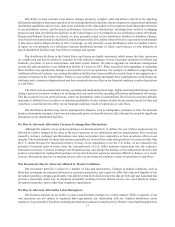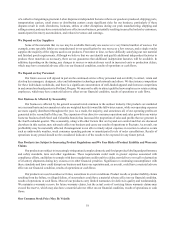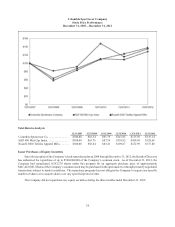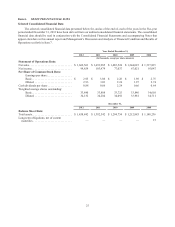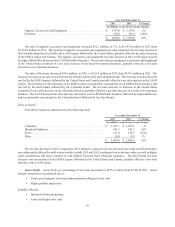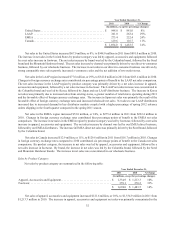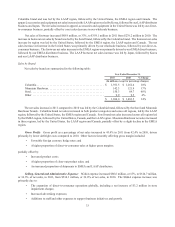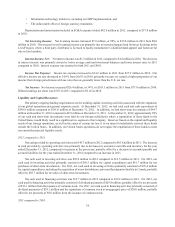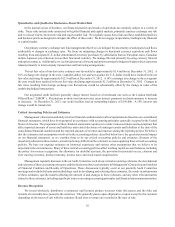Columbia Sportswear 2012 Annual Report Download - page 30
Download and view the complete annual report
Please find page 30 of the 2012 Columbia Sportswear annual report below. You can navigate through the pages in the report by either clicking on the pages listed below, or by using the keyword search tool below to find specific information within the annual report.26
Item 7. MANAGEMENT’S DISCUSSION AND ANALYSIS OF FINANCIAL CONDITION AND RESULTS OF
OPERATIONS
This annual report, including Item 1 of Part I and Item 7 of Part II, contains forward-looking statements. Forward-
looking statements include any statements related to our expectations regarding future performance or market position,
including any statements regarding anticipated sales and operating margins across markets, distribution channels and product
categories, access to raw materials and factory capacity, financing and working capital requirements and resources,
establishment and operation of our joint venture in China, and our exposure to market risk associated with interest rates
and foreign currency exchange rates.
These forward-looking statements, and others we make from time to time, are subject to a number of risks and
uncertainties. Many factors may cause actual results to differ materially from those projected in forward-looking statements,
including the risks described above in Item 1A, Risk Factors. We do not undertake any duty either to update forward-
looking statements after the date they are made or to conform them to actual results or to changes in circumstances or
expectations.
Our Business
As one of the largest outdoor apparel and footwear companies in the world, we design, source, market and distribute
active outdoor apparel, footwear, accessories and equipment under the Columbia, Mountain Hardwear, Sorel and Montrail
brands. Our products are sold through a mix of wholesale distribution channels, independent distributors, and our own
direct-to-consumer channels. In addition, we license our Columbia trademarks across a range of apparel, footwear,
accessories and equipment.
The popularity of outdoor activities, changing design trends, consumer adoption of innovative performance
technologies and the availability and desirability of competitor alternatives affect consumer desire for our products.
Therefore, we seek to drive, anticipate and respond to trends and shifts in consumer preferences by adjusting the mix of
available product offerings, developing new products with innovative performance features and designs, and creating
persuasive and memorable marketing communications to generate consumer awareness, demand and retention. Failure to
anticipate or respond to consumer needs and preferences in a timely and adequate manner could have a material adverse
effect on our sales and profitability.
Seasonality and Variability of Business
Our business is affected by the general seasonal trends common to the outdoor industry and is heavily dependent upon
weather and discretionary consumer spending patterns. Our products are marketed on a seasonal basis and our sales are
weighted substantially toward the fall season, while our operating costs are more equally distributed throughout the year.
The expansion of our direct-to-consumer operations has increased the proportion of sales and profits that we generate in
the fourth calendar quarter. As a result, our sales and profits tend to be highest in the third and fourth calendar quarters. In
2012, approximately 63 percent of our net sales and all of our profitability were realized in the second half of the year,
illustrating our dependence upon sales results in the second half of the year, as well as the less seasonal nature of our
operating costs.
We generally solicit orders from wholesale customers and independent distributors for the fall and spring seasons
based on seasonal ordering deadlines that we establish to aid our efforts in planning manufacturing volumes to meet demand
for each of our selling seasons. We typically ship the majority of our advance fall season orders to wholesale customers
and independent distributors beginning in June and continuing through November. Similarly, the majority of our advance
spring season orders ship to wholesale customers and independent distributors beginning in December and continuing
through May. Generally, orders are subject to cancellation prior to the date of shipment.
Results of operations in any period should not be considered indicative of the results to be expected for any future
period, particularly in light of persistent volatility in economic conditions. Sales of our products are subject to substantial
cyclical fluctuation, the effects of unseasonable weather conditions, the relative popularity of competitors' brands, and the
continued popularity of outdoor activities as part of an active lifestyle in key markets. Volatile economic environments in
key markets, coupled with inflationary or volatile input costs, reduce the predictability of our business.



